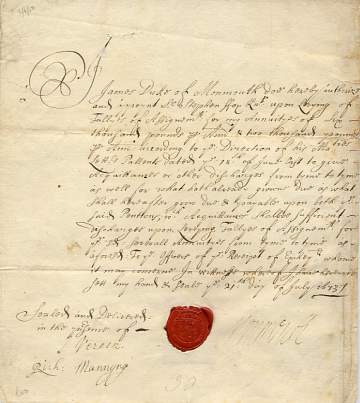

|

MONMOUTH, James Scott, Duke of (1649-1685). Natural son of Charles I. Led rebellion of 1685; executed. Document Signed, 1 page 4to with red wax seal, 21 July 1673/4. A power of attorney to Sir Stephen Fox to receive his annuities of £6,000 and £2,000 per annum under His Majesty's Letters Patent. Signed as witnesses by J[ames] Vernon and Richard Manning. 'I James Duke of Monmouth doe hereby authorize and appoynt Sr Stephen Fox Knt. upon Levying of Tallyes of Assignem[en]t for my Annuityes of Six thousand pounds P[er] Ann[um] & two thousand pounds p[er] Ann[um] according to ye Direction of his Ma[jes]ties Letters Pattents dated ye 18th of June last to give Acquittances or other discharges from tyme to tyme as well for what hath already growne due as what shall hereafter grow due & payable upon both ye said Pentions, w[hi]ch Acquittances shalbee sufficient discharges upon Leveying Tallyes of Assignem[en]t for ye s[ai]d severall Annuities from tyme to tyme as afores[ai]d: To ye Officers of ye Receipt of Excheq[ue]r whome it may concerne In wittnesse whereof I have hereunto sett my hand & seal ...'James Vernon (1646-1727) became Monmouth's private secretary in 1673 and was given a pension of £300 a year. As Monmouth's secretary Vernon served with the duke in Scotland and Flanders and was given a seat in parliament as his client. His relationship with Monmouth was close; it was alleged that it was Vernon who erased the word 'natural' from Monmouth's patent for the post of commander-in-chief in 1674, which identified Monmouth as Charles II's 'natural son'. While in Flanders with the duke Vernon kept a journal of the campaign of 1678 which was meant to illuminate his patron's noble deeds. In the campaign against the Scottish covenanters in 1679 Vernon remained ever close to the duke and was later satirized as one of Monmouth's creatures and a possible evil counsellor. He sat for Cambridge University in the first parliament of 1679 and voted for the bill to exclude the duke of York from the succession. Vernon later became uncomfortable with Monmouth's politics, expressing the wish to Edmund Warcup that 'M[onmouth] would leave the party and return to [the] K[ing]' ('Journals of Edmund Warcup', 256). He did not, however, leave Monmouth's service until the duke went into exile for a second time in 1684. A warrant was issued for Vernon's arrest in June 1685 during Monmouth's rebellion. A whig 'collaborator' in 1688, he went over to William's service by late December. He donated £1500 to the new regime. [No: 22384]
| |